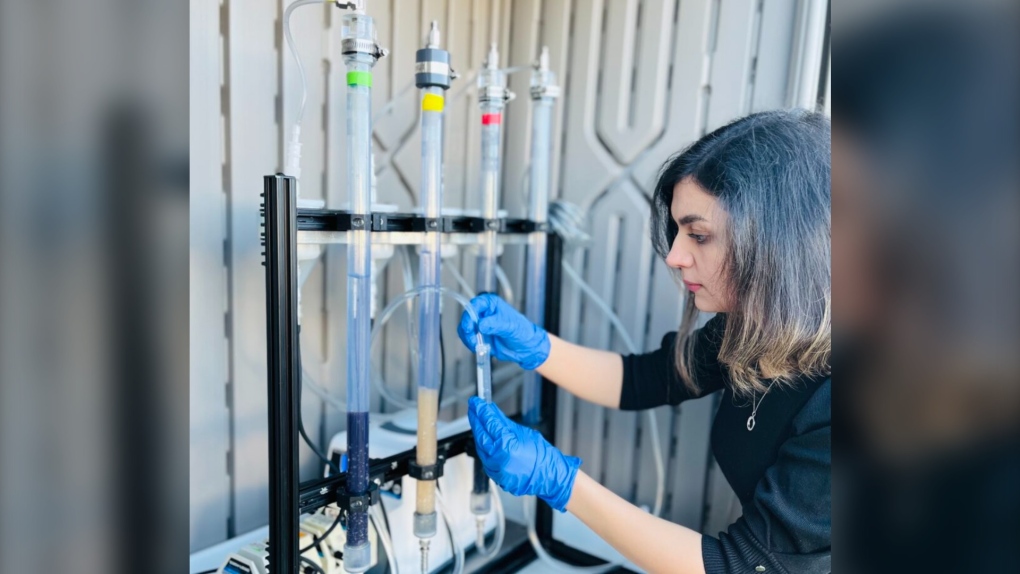'Think Brita filter but a thousand times better': New UBC water treatment zaps chemicals
 Researchers out of the University of British Columbia have developed a new treatment designed to remove "forever chemicals" from drinking water for good. Photo: Mohseni lab
Researchers out of the University of British Columbia have developed a new treatment designed to remove "forever chemicals" from drinking water for good. Photo: Mohseni lab
Researchers out of the University of British Columbia have developed a new treatment designed to remove "forever chemicals" from drinking water for good.
In a news release Wednesday, UBC said forever chemicals (also known as PFAS) are a "large group of substances that make certain products non-stick or stain-resistant" and these kinds of chemicals can lead to a wide range of health problems, including cancer, cardiovascular disease, developmental delays and hormonal disruption.
The new water treatment would zap those chemicals safely and efficiently, according to researchers.
"Think Brita filter but a thousand times better," said UBC chemical and biological engineering professor Dr. Madjid Mohseni in the release.
Mohseni — who developed the technology — added that forever chemicals are found mostly in raingear, non-stick cookware, stain repellents and certain foams used to put out fires.
To remove them from drinking water, Mohseni and a group of other researchers created a unique adsorbing material that is capable of trapping the chemicals present in the water supply.
The chemicals are then destroyed using special electrochemical and photochemical techniques, he said.
"While there are treatments currently on the market, like activated carbon and ion-exchange systems which are widely used in homes and industry, they do not effectively capture all the different PFAS, or they require longer treatment time," said Mohseni.
"Our adsorbing media captures up to 99 per cent of PFAS particles and can also be regenerated and potentially reused. This means that when we scrub off the PFAS from these materials, we do not end up with more highly toxic solid waste that will be another major environmental challenge."
While PFAS are no longer manufactured in Canada, Mohseni said they are still incorporated in many consumer products and can then leach into the environment.
"When we apply stain-resistant or repellent sprays/materials, wash PFAS-treated raingear, or use certain foams to put out fires, the chemicals end up in our waterways," said Mohseni, adding that certain cosmetics and sunscreens containing PFAS can also allow the chemicals to find their way into the body.
According to researchers, most exposure is through food and consumer products but people can also be exposed to the chemicals through drinking water — especially if they live in areas with contaminated water sources.
"Our adsorbing media are particularly beneficial for people living in smaller communities who lack resources to implement the most advanced and expensive solutions that could capture PFAS," said Mohseni. "These can also be used in the form of decentralized and in-home water treatments."
Mohseni and his team are planning to pilot the new technology at a number of locations across B.C. starting this month.
"The results we obtain from these real-world field studies will allow us to further optimize the technology and have it ready as products that municipalities, industry and individuals can use to eliminate PFAS in their water," said Mohseni.
CTVNews.ca Top Stories

Ontario Premier Doug Ford threatens to cut off energy to U.S. in response to Trump's tariffs
Ontario Premier Doug Ford has threatened to cut off energy supply to the U.S. in response to the tariffs President-elect Donald Trump plans to impose on all Canadian imports.
Elon Musk calls Justin Trudeau 'insufferable tool' in new social media post
Billionaire Elon Musk is calling Prime Minister Justin Trudeau 'an insufferable tool' in a new social media post on Wednesday. 'Won't be in power for much longer,' Musk also wrote about the prime minister on 'X.'
Sask. hockey coach convicted of historic sex crime back on day parole after 'behavioural concerns'
A former WHL coach found guilty last year of sexually assaulting a teen boy is back on day parole.
The Body Shop Canada to be sold to Serruya Private Equity
The Body Shop Canada is due to be sold to a company led by the co-founder of frozen yogurt chain Yogen Früz.
Trudeau will have to 'kiss the ring' to achieve smoother bilateral relations with Trump: John Bolton
If Prime Minister Justin Trudeau wants to get on U.S. president-elect Donald Trump's good side for the sake of a smooth bilateral relationship, he'll likely have to be openly deferential, says former U.S. National Security Advisor, John Bolton.
'Fire hazard': Health Canada recalls candles over how they burn
Health Canada announced Wednesday a consumer product recall on candles in ceramic containers due to fire hazards, a release from the agency reads.
Luxury real estate brokers charged in federal indictment with sex trafficking in NYC
Two luxury real estate brokers and their brother have been charged with luring, drugging and violently raping dozens of women over more than a decade.
Alberta family doctor suspended for unprofessional conduct
An Alberta family doctor and veterinarian has been suspended for unprofessional conduct.
Police locate labyrinth of tunnels connecting tents to generator in Hamilton encampment
Hamilton police say that they discovered a series of 'man-made holes and tunnels' during a patrol of a downtown encampment earlier this week.

































